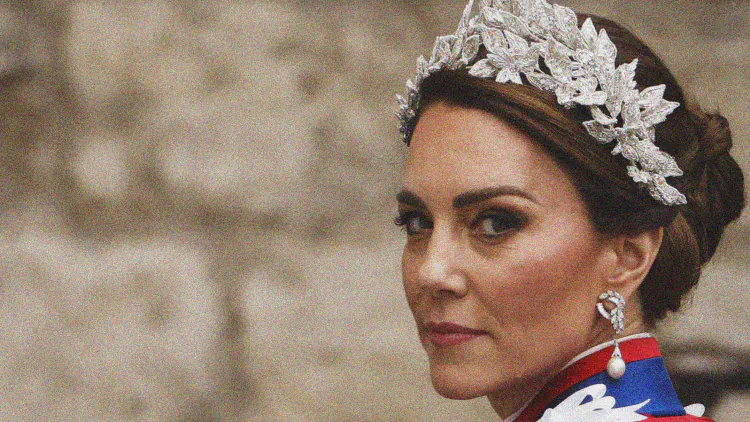What Kate Middleton Proved About the Internet
People are just fodder for the machine.

It was always going to end this way. The truth about Kate Middleton’s absence is far less funny, whimsical, or salacious than the endless memes and conspiracy theories suggested. In a video recorded and broadcast by the BBC, the princess says she has cancer, and that she had retreated from the public eye to deal with her condition while attempting to shield her children from the spotlight. Instead, she had to contend with the internet giggling about whether she’d had a Brazilian butt lift. My colleague Helen Lewis summed it up succinctly this afternoon: “I Hope You All Feel Terrible Now.”
What is there to learn from such a sad situation? The internet is made up of people, yet its architecture abstracts this basic truth. As I wrote a few weeks ago, at the center of this months-long story was essentially “a sea of people having fun online because it is unclear whether a famous person is well or not.” Underneath the memes was always something a little bit gross and indefensible.
[Read: Just asking questions about Kate Middleton]
Perhaps humans are just wired this way—to gawk and gossip. There’s nothing new about hounding a member of the royal family or invading the privacy of a celebrity to sell tabloids or go viral. You don’t even have to be a scold about it: Famous people are wealthy and beloved at least in part because they’re fun to talk about. Exactly what we do and don’t know about their internal lives is part of the allure—the discourse comes with the territory, to a degree.
But Kate Middleton, of course, is a human too. During this saga, I kept thinking about the reappraisal of Britney Spears in 2021, as well as the backlash toward past media and tabloid coverage of her rise. A New York Times documentary dredged up old coverage of Spears from the mid-aughts, showing a young woman clearly in distress, being picked apart by glossy magazines. Her suffering became entertainment. The response to this film was swift; some of the people and institutions that had shamelessly delighted in her pain backtracked: Glamour publicly apologized to the pop star on its Instagram account, noting, “We are all to blame for what happened to Britney Spears.”
Contrast the Spears reckoning with the Middleton drama and, if you’re being generous, you can see some of that newfound attitude in the media. I was struck by Lewis’s observation that “Britain’s tabloid papers have shown remarkable restraint” throughout this mess. Progress, perhaps, but what’s also telling is that they didn’t really need to do the dirty work: Random people on the internet were doing it for them. They recklessly speculated, memed, and used their amateur sleuthing and networked faux expertise to concoct elaborate, semi-plausible explanations for her absence. Was Kate’s face actually Photoshopped from a Vogue spread? It wasn’t, but the conspiratorial tweet got 51.1 million views anyhow. Missing from much of the discourse was the idea that its main character was a person who was likely struggling. In essence, the internet democratized the tabloid experience, turning the rest of us into paparazzi and addled editors workshopping headlines and cover images—not to sell magazines, but to amass some kind of fleeting online popularity.
[Read: Kate Middleton and the end of shared reality]
In my least charitable moments, I see this toxic dynamic as the lasting legacy of social media—a giant, metrics-infused experiment in connectivity that has had a flattening, pernicious effect. In 2021, I interviewed Elle Hunt, a journalist who’d tweeted an innocuous opinion about horror movies one evening and woke up to find she was trending on Twitter, her feeds choked with thousands of furious replies and threats. When I asked her to describe the experience of becoming Twitter’s main character for the day, she summed it up thusly: “You’re repurposed as fodder for content generation in a way that’s just so dehumanizing.” Three years later, these words resonate even stronger. What Hunt described to me then as “a platform failure,” feels to me now like a learned behavior of the internet, where people, famous and not, are repurposed as fodder for content generation.
The cycle repeats itself endlessly. This afternoon, the memes about Middleton shifted—from jokes about her whereabouts to jokes about how awful it was that everyone had been making fun of a cancer patient. Feeling bad about the memes tweets immediately became a meme unto themselves. Despite the tone shift, the reason for these posts is the same: They’re a way to take a person and repurpose their life for entertainment and engagement. If this sounds exhausting and depressing, it’s because it is.
But the internet is also too big to be one thing. Clicking through social media this afternoon, I saw dozens of heartfelt testimonials, apologies, and well-wishes for the princess. For a moment, from my perspective, it felt like watching a collective of people come to their senses. A recognition, perhaps, of the humanity of the person at the center of the maelstrom.
Then, only a few seconds later, I saw a different post. It was a screenshot from the blockchain platform Solana, where users can create their own cryptographic tokens for others to invest in. The name of the token in the screenshot is “kate wif cancer,” and its logo is a still of the princess sitting on a bench, taken from this afternoon’s video. The coin’s market cap briefly surpassed $120,000. Only six minutes later, the price had cratered—the result of a standard memecoin sell off. An awful thing happened. Some people made a joke about it. Other people made some money. And then everyone moved on.
What's Your Reaction?




















